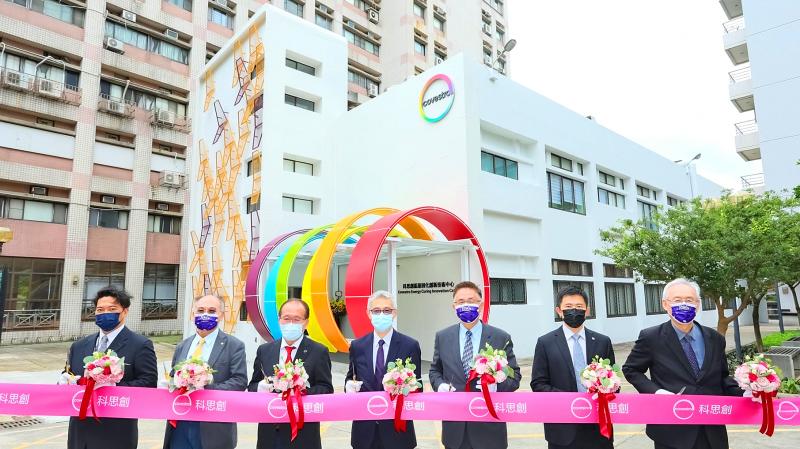Covestro Taiwan Ltd (台灣科思創) yesterday launched a new research and development center that is to specialize in resin synthesis and fiberoptic coating after its parent company, Covestro AG, acquired a resins business from Royal DSM, it said.
The German company in September 2020 agreed to buy the resins and functional materials business from Royal DSM for about 1.61 billion euros (US$1.69 billion), corporate data showed.
The Dutch company’s local units, such as Covestro Resins (ROA) Ltd (帝昇) and Covestro Resins (Taiwan) Ltd (新力美), are next month to be integrated into Covestro Taiwan Ltd, with their employees continuing resins development, Covestro Taiwan said.

Photo courtesy of Covestro Taiwan Ltd
The Covestro Global Energy Curing Innovation Center was established at National Central University (NCU) in Taoyuan as part of its collaboration with local universities, the company said.
The 1,322m2 facility marks the first global research center located on a Taiwanese university campus and managed by a foreign company, it said.
Aiming to find new solutions to make its ultraviolet (UV)-cured resin synthesis process more sustainable, the company asked eight NCU professors, along with about 20 students, to work on four projects, and expects results by the end of next year, research center head Steve Shih (石健學) told the Taipei Times in an interview.
“Tin is a key production component, and we have managed to minimize tin residues to lower than one part per million, but in the event something goes wrong, we need another material with comparable performance that can substitute for tin,” Shih said, citing an example of one of the center’s projects.
The company is also attempting to seek appropriate bio-based materials, such as plant matter, to replace fossil-based material, as 25 percent of its products are to be made from bio-based materials by 2030, Shih said.
Covestro Taiwan is also working with National Taiwan University and National Chung Hsing University on cutting-edge research on resin development, Shih added.
UV-curable resin is used in a variety of coating applications for fiber optic cables, solar panels, electronic materials, ink printing, floors, premium wood items and papers, Covestro Resins Ltd general manager Troy Shao (邵仲益) told the Taipei Times.
It can also be used inside computing technology given its ability to refract light, Shao said.
A leading Taiwanese semiconductor company has utilized Covestro Taiwan’s technology to make its manufacturing process more sustainable and efficient, he said.
Covestro Taiwan is optimistic that its technology will be applied in Taiwanese 5G networks and to help install thinner glass fibers, he added.

Vincent Wei led fellow Singaporean farmers around an empty Malaysian plot, laying out plans for a greenhouse and rows of leafy vegetables. What he pitched was not just space for crops, but a lifeline for growers struggling to make ends meet in a city-state with high prices and little vacant land. The future agriculture hub is part of a joint special economic zone launched last year by the two neighbors, expected to cost US$123 million and produce 10,000 tonnes of fresh produce annually. It is attracting Singaporean farmers with promises of cheaper land, labor and energy just over the border.

US actor Matthew McConaughey has filed recordings of his image and voice with US patent authorities to protect them from unauthorized usage by artificial intelligence (AI) platforms, a representative said earlier this week. Several video clips and audio recordings were registered by the commercial arm of the Just Keep Livin’ Foundation, a non-profit created by the Oscar-winning actor and his wife, Camila, according to the US Patent and Trademark Office database. Many artists are increasingly concerned about the uncontrolled use of their image via generative AI since the rollout of ChatGPT and other AI-powered tools. Several US states have adopted

KEEPING UP: The acquisition of a cleanroom in Taiwan would enable Micron to increase production in a market where demand continues to outpace supply, a Micron official said Micron Technology Inc has signed a letter of intent to buy a fabrication site in Taiwan from Powerchip Semiconductor Manufacturing Corp (力積電) for US$1.8 billion to expand its production of memory chips. Micron would take control of the P5 site in Miaoli County’s Tongluo Township (銅鑼) and plans to ramp up DRAM production in phases after the transaction closes in the second quarter, the company said in a statement on Saturday. The acquisition includes an existing 12 inch fab cleanroom of 27,871m2 and would further position Micron to address growing global demand for memory solutions, the company said. Micron expects the transaction to

A proposed billionaires’ tax in California has ignited a political uproar in Silicon Valley, with tech titans threatening to leave the state while California Governor Gavin Newsom of the Democratic Party maneuvers to defeat a levy that he fears would lead to an exodus of wealth. A technology mecca, California has more billionaires than any other US state — a few hundred, by some estimates. About half its personal income tax revenue, a financial backbone in the nearly US$350 billion budget, comes from the top 1 percent of earners. A large healthcare union is attempting to place a proposal before